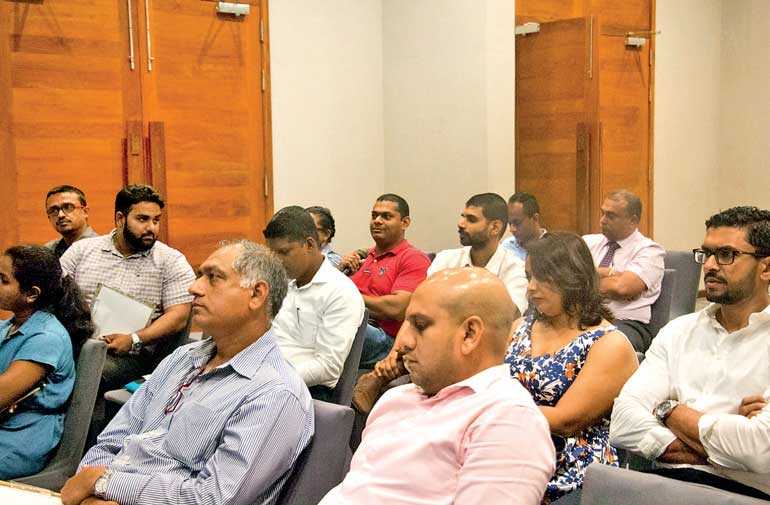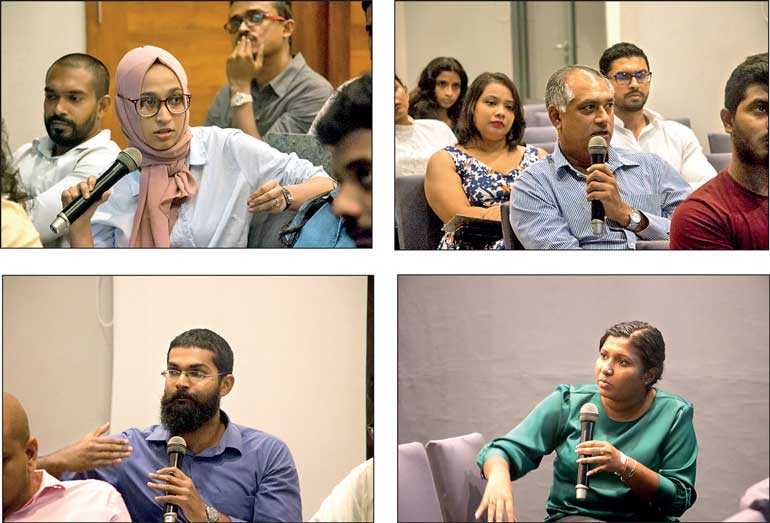Wednesday Feb 18, 2026
Wednesday Feb 18, 2026
Tuesday, 24 September 2019 00:00 - - {{hitsCtrl.values.hits}}

By Aysha Maryam Cassim
As global implications of climate change affect businesses, companies are showing an increased commitment to integrate sustainability into the core of their strategy by transforming its business approaches, products and customers. However, communicating sustainability to the consumer mindset and taking the movement beyond a fad remains a challenge of our times.
At the recent ‘The Way Forward’ Forum held at Jetwing 7 Colombo, entrepreneurs and professionals came together to discuss how business and sustainability could work together. The event, organised by Eco Lanka Consultants and Todds, explored the relationships between sustainable practices and company performance and the ways to encourage honest dialogue and cooperation between local businesses.
Niroshi Pereira, the Chief Business Development Officer at Eco Lanka Consultants – an environmental think-tank dedicated to providing total environmental solutions to clients – welcomed the gathering, reminding everyone how our actions impact the world and the environment we call home.
The forum commenced with an overview of how sustainability affects businesses and the society we live in and to create a way forward that amalgamates the three bottom lines of sustainable businesses which are people, planet and profit.
PEOPLE
Retaining the human element of businesses
Aitken Spence Hotels Sri Lanka Head of Sustainability Operations – Hospitality Rishard Preena said: “In the forefront of continuous sustainable development, people become mobile. Everybody wants growth in their careers and lives. In hospitality, however, we always keep the doors open for our employees to come back once they leave in search of progress. We need to encourage and empower local talent while changing the dynamics of gender and employee demographics. From our end, we nurture a sustainable workforce by ensuring that minimum of 40% of our staff comes from areas within a radius of two km from the hotel.”
Cafe Kumbuk Co-owner and Corporate Trainer Dinali Dandeniya mentioned the underlying issue of small businesses in Sri Lanka: “There is a belief that certificates are the way forward. Lack of work ethics is a big concern in Sri Lanka. We need to get people out of that expectation and value the positive outcomes that vocational training and competency development can bring into a company. Organisations which need to work smarter have to adapt that. We also need to see the benefits of working across instead of looking at a high marquee.”
Breaking through barriers
Among the issues and concerns that were raised by business owners of SMEs at the forum, labour shortage, budget constraints, lack of demand and legislation were prominent.
Rajitha Yasarathna and Shilpa Samaratunge are from Bhumi Eco Alternatives – an online market place dedicated to making ethical, cruelty-free, sustainable products more accessible to people in Sri Lanka.
“We offer earth-friendly alternatives to everyday items that we use but finding people who make these products are difficult to find. Yes, we have the skills and capability, but unless we make the concept of sustainability appeal to more people, we cannot generate a demand and drive profits.”
LOVI Ceylon Chief Commercial Officer Simeon Lawrence mentioned that to keep up the standards in the market, local workmanship must be valued.
“Products made in Sri Lanka need not be cheap. We have to pay the right price to the local craftsmanship to sustain the market value. At LOVI, we are working on local solutions to get embroidery work done for our designs.”
BioFuel Lanka is a renewable energy management company that offers financially viable biogas and biodiesel solutions to its continually-growing client base. CEO Michael Magala stated a few problems the company came across in one of its waste to energy solutions projects.
“Converting cooking oil into biodiesel started as a cottage industry but it never took off beyond it. All the hotels and fast-food chains sell their oil to the second-hand market where the reused oil goes to street food vendors for a cheaper price. This is a serious health hazard.”

PROFITS
Business with purpose and profit
While sustainability gives companies a competitive edge in the industry along with brand presence and visibility, the question remains as to whether profit and sustainability can go hand-in-hand. Attendees in the forum conveyed how companies can generate profits while connecting sustainability agendas with private sector and local actions.
Solutions to sustainability with self-sufficiency
Manjula Priyadarshana, Director of Nutrinut, specialises in 100% organic coconut products. With full control of the supply chain, he has managed to sustain his business overcoming the challenges that inhabit the coconut industry while uplifting lives of people who engage in organic plantation operations.
“I define myself as an integrated manufacturer who maintains plantation to manufacturing and distribution all within my control. I had to find ways to stand out. We are in the journey of creating the world’s largest integrated operation in value-added organic coconut processing starting from our plantations. As a response to the growing demand, we are actively developing more organic lands to ensure a sustainable supply chain of organic products into the future. Our landowners will have an industry above the return on their lands with a greater sustainability.”
Sustainability in hospitality
Taking the audience through Jetwing’s journey towards sustainability, Senal Siriwardene, Experiential Architect at Jetwing Hotels, highlighted how its efforts in sustainable tourism industry have turned into a lucrative means of business in a little time.
“One of our largest investments to date, Jetwing Yala exceeded profit margins within a short number of years. Sustainability pays off in the long run. Jetwing Vil Uyana is not the most technologically advanced resort but it is built around a different concept of sustainability. Set in a nature reserve, today, the wetland around Vil Uyana attracts 153 species of birds, three wildcats along with people who are flocking to experience this habitat.”
Creating the appeal
According to Jinasena Ltd. Head of Marketing Business Development Ian Karunarathne, education and awareness would automatically influence consumers’ purchasing decisions towards brands that are committed to environmentally-conscious conduct.
“Make something look good with substance, eventually people will want it. Sustainability is all about awareness. The consumer should be able to relate to the product you are trying to pitch in.”
PLANET
Policies and partnerships – Giving back life to earth and communities with Coca Cola
Coca-Cola Beverages Sri Lanka Ltd. recently launched its first ‘Give Back Life’ PET plastic Collection Centre in Delgoda. The project intensifies its regional efforts to promote and inculcate the sustainable habit of recycling PET plastic amongst communities. This project along with its approach to water stewardship resonates with Coca-Cola’s key sustainability priorities to give water back to the earth in their replenishment efforts and supporting the economic empowerment of people.
Coca-Cola Beverages Sri Lanka Ltd. Country Public Affairs and Communication Manager Lakshan Madurasinghe mentioned that finding ways to spark the conversation about policymaking around the use of recycled materials is a battle that everyone needs to engage in. “We cannot do this alone. We need partnerships to leverage and scale up.”
Every little matters
“When promoting a sustainable business, we have to be mindful of the location and its people. We often forget about the suburbs and the communities who are sustained from local resources. A simple thing as sharing knowledge on organic farming can go a long way in engaging communities towards sustainability,” said Environmental Foundation Ltd. Legal Officer Hafsa Hudha.
The way forward
The Way Forward Forum put forward the outstanding and impactful work carried out by professionals in the Sri Lankan sustainability industry. Park Ville’s FlipYarn sunglasses made from upcycled flip flops and Carbon-Neutral Pest Control System by Suren Cooke Agencies are some of the examples that echoed the importance of how considerable progress on sustainability can be made, despite the multitude of challenges in the industry.
The Way Forward forum activated likeminded individuals to create a network of decision-makers, business leaders with civil society, providing new momentum to drive sustainability into economic activities.
In the future, the forum is determined to engage youth to generate solutions towards our sustainability endeavours while accelerating the conversation with innovative ideas that could enable business growth while safeguarding our future.